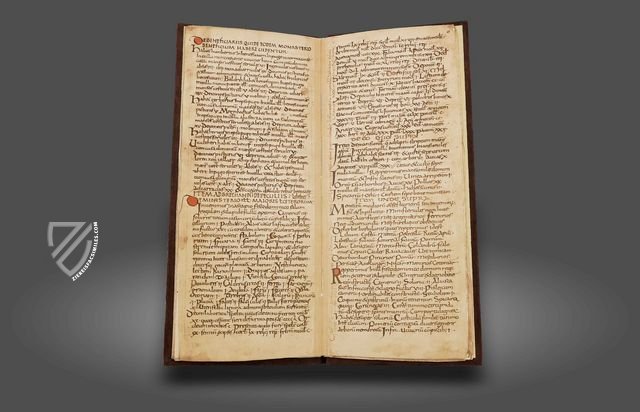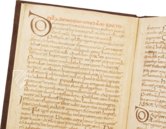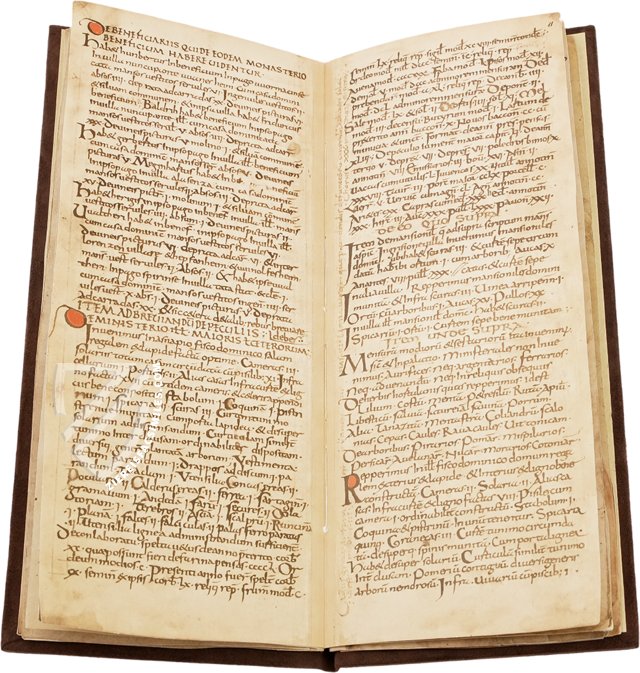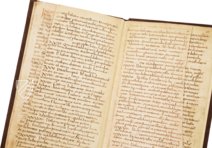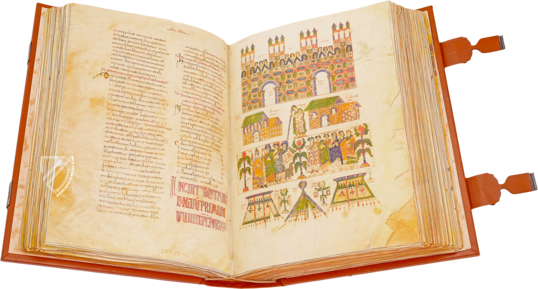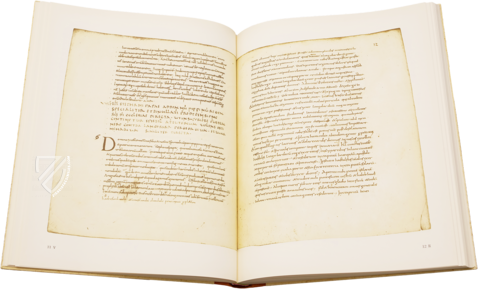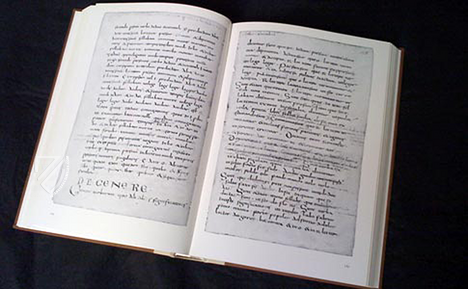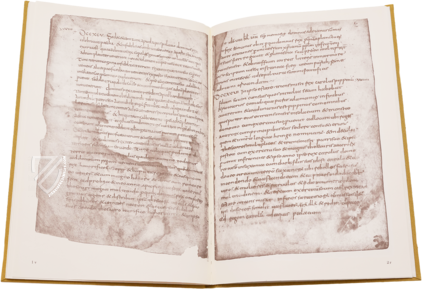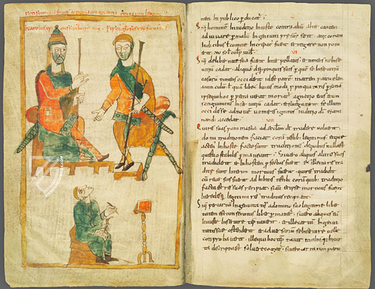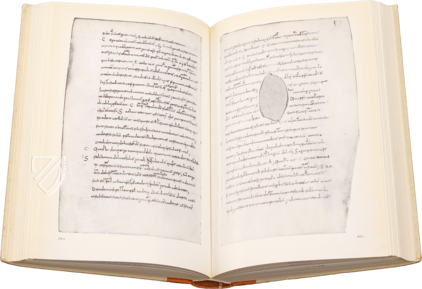Capitulare de Villis
(under 1,000€)
The Capitulare de Villis originates from the later years of the reign of the Emperor Charlemagne and lists a series of regulations for the overall management of royal property. It is one of several capitularies issued by Carolingian royalty concerning the organization and administration of their estates and reflects Charlemagne’s reforms to the government of the Franks. Details surrounding the origins of the manuscript are disputed, but it is generally believed that it was created at a time when the Carolingian court became settled in Aachen. It was likely intended to manage the logistical difficulties of supplying and maintaining food and equipment for administrators and soldiers at a fixed capital far from most of the estates, or in preparation for a military campaign. Although divided into seven chapters including justice, agricultural land use, taxes, and regulating trade, the majority of the text is devoted to describing the duties of the iudex, a royal official charged with managing royal properties, prosecuting criminals, and collecting taxes – both in cash and in kind – to be brought to the Carolingian court. The document is thus of great importance for understanding Carolingian material culture and political administration.
Capitulare de Villis
The Capitulare de Villis is a precious document offering valuable insights into one of the most important periods of European history, a time of change and transition following the reunification of most of the Western Roman Empire under Emperor Charlemagne. The Frankish court, which had previously been located wherever the king was as it was necessary for him to constantly travel through his lands to maintain his authority, was now being settled in a permanent location: Aachen, on the western bank of the River Rhine. Although it is debated whether this manuscript was created in Fulda or the Rhineland, it is generally agreed that it originated between 771 and 800. The document thus serves as a textual witness to the system of taxation and provision of logistical support for the army. While the administration it describes is fairly simple form a modern perspective, the document reveals Charlemagne’s detailed attention to the governance of the empire he created. Therefore, while the Capitulare de Villis may not be helpful for understanding the economy of the empire as a while, it is useful for understanding the material culture and political/military administration of the Carolingians.
Administering a New Empire
It is one thing to conquer, it is another to rule. Charlemagne understood this because he was more than a Frankish warlord, but a learned man who cast himself in the mold of the Caesars. As such, the majority of the text is devoted to the administration of justice, the management of royal properties, and the inventory and transportation of an estate’s taxes – either in money, food, or goods – to the court at Aachen. These duties were the responsibilities of the iudex, a royal official who served as a manager and overseer of subordinate officials in addition to administering justice. In terms of food, little is said about the cultivation of crops or the raising of animals aside from expected quotas, but the raising of puppies and foals is discussed in detail, which underlines the importance of dogs and horses for hunting and warfare. The Capitulare de Villis also stipulates the management of land, such as the clearing of forests for cultivation, and mandates a certain number of craftsmen in various trades on the estates.
The Role of Women
Insights into the role of aristocratic women in Frankish society during this period can be gleaned from this document, particularly with regard to the management of royal estates. Although men employed in the role of iudex carried most of the responsibility, queens were also expected to perform official duties, especially in the absence of her husband. Not only did they have overlapping responsibilities, but the various stewards would have to work under the direction of her royal authority. Furthermore, queens had the power to administer justice in the absence of a iudex. More broadly, the responsibilities of aristocratic women were tooted in hospitality in particular – the capitulary specifies the number of beds and linens that were to be kept on hand for potential guests. This was not merely about throwing parties but also displaying the wealth of the family. Furthermore, these aristocratic homes also served official functions including serving as lodgings for travelling officials and army headquarters.
Codicology
- Alternative Titles
- Caroli Magni imp. Cap. de villis, Leo III papa
Capitulary of Manors - Size / Format
- 32 pages / 30.8 × 12.5 cm
- Origin
- Germany
- Date
- Between 825 and 850
- Epochs
- Style
- Script
- Carolingian Minuscule Uncial
- Illustrations
- Ornamental initials, rubrics, and headlines in red display script
- Content
- Leo III papa, epistolae ad imperatorem Carolum Magnum (ff. 1r-8r)
Brevium exempla, ad describendas res ecclesiastiacas et fiscales (ff. 9r-12r)
Carolus Magnus imperator: Capitulare de villis vel curtis imperii (ff. 12r-16r) - Previous Owners
- Matthias Flacius Illyricus
Herzog Heinrich Julius
University library Helmstedt
Capitulare de Villis
Letter from Pope Leo III to Emperor Charlemagne
When the manuscript was rebound in 1966, its collection of transcribed letters from Leo III to Charlemagne were accidentally placed at the beginning, thus the main content that is now ff. 9-16 was originally appended with these letters, which are counted as ff. 1–8 in the modern pagination. Confusion aside, this is the incipit to the first of the letters, which were written between 808 and 814. They cover a variety of subjects ranging from personal matters between the two men to the latest news from Constantinople including the juicy details of various coups as the Byzantines were rattled by internal divisions and external invasions.
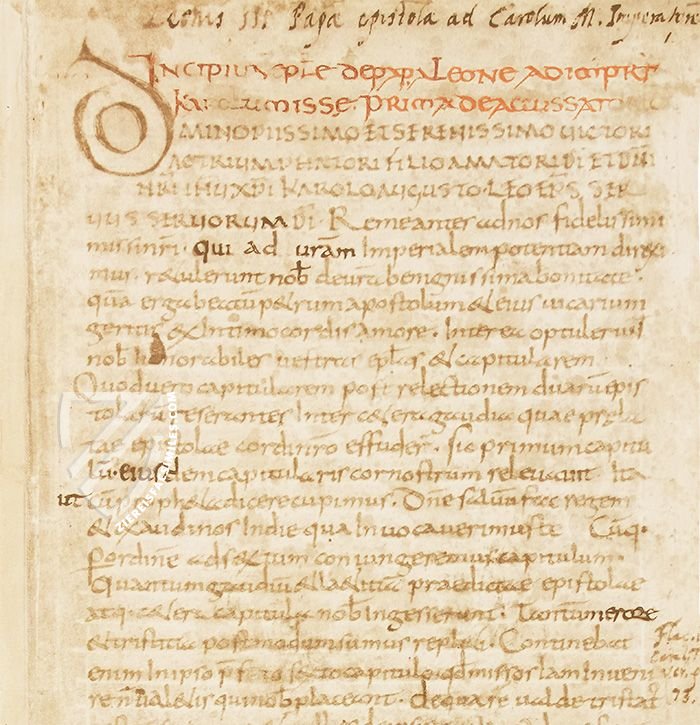
Capitulare de Villis
List of Plants for a Carolingian Garden
The final chapter of the manuscript contains a clearly written list of 94 species including 73 herbs, 16 fruit trees, and 5 plants for creating dyes and textiles that were to be planted by imperial administrators in their gardens, climatic conditions permitting. Ideally, this selection of plants would provide physicians with all the necessary ingredients for treating various illnesses, as well as providing for the overall health and care of the local population, e.g., by ensuring a supply of vitamin-rich fruits.
This document lays out the foundations of a system of self-sustaining communities that could feed, clothe, and care for themselves. In his wisdom, Charlemagne made the construction and maintenance of such gardens compulsory, and many continue to exist today. Charlemagne’s was thus a wise ruler who did not merely conquer and then collect tribute bought sought to care for his subjects as the “Father of Europe”.
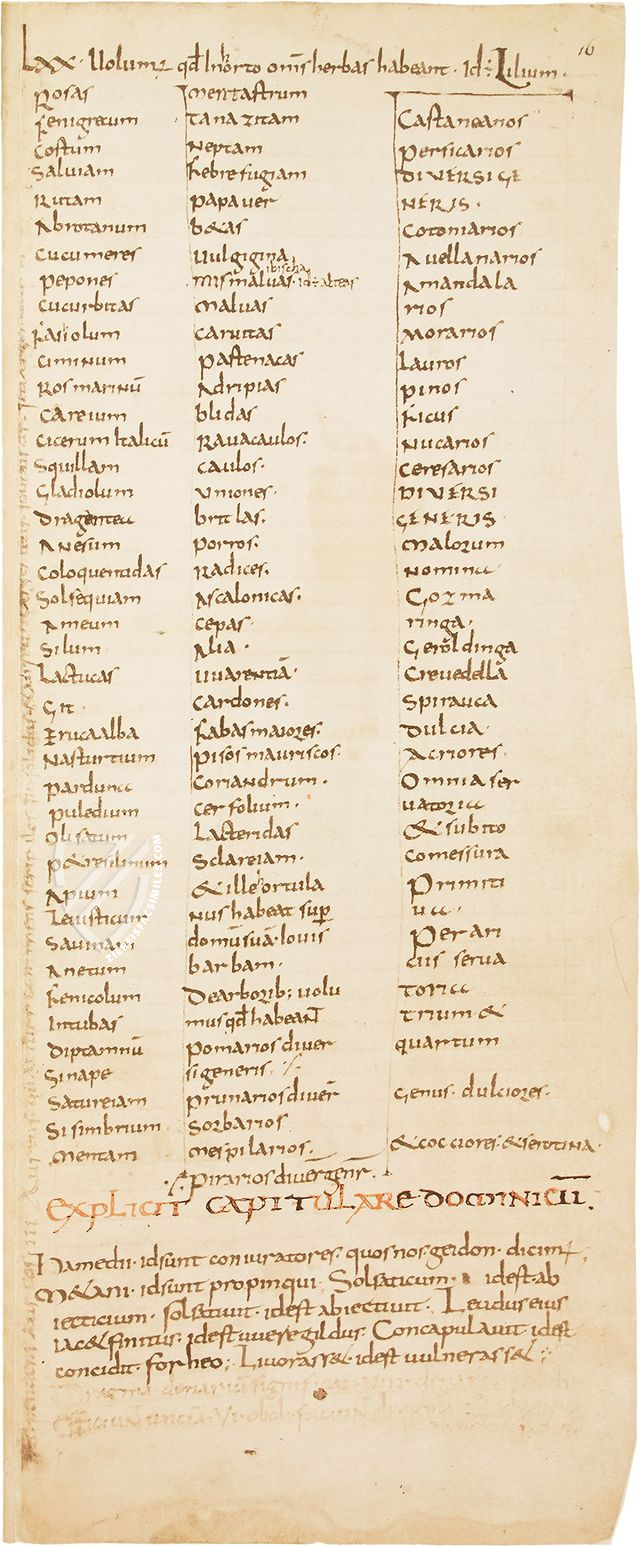
#1 Capitulare de Villis
Language: German
(under 1,000€)
- Treatises / Secular Books
- Apocalypses / Beatus
- Astronomy / Astrology
- Bestiaries
- Bibles / Gospels
- Chronicles / History / Law
- Geography / Maps
- Saints' Lives
- Islam / Oriental
- Judaism / Hebrew
- Single Leaf Collections
- Leonardo da Vinci
- Literature / Poetry
- Liturgical Manuscripts
- Medicine / Botany / Alchemy
- Music
- Mythology / Prophecies
- Psalters
- Other Religious Books
- Games / Hunting
- Private Devotion Books
- Other Genres
- Afghanistan
- Armenia
- Austria
- Belgium
- Belize
- Bosnia and Herzegovina
- China
- Colombia
- Costa Rica
- Croatia
- Cyprus
- Czech Republic
- Denmark
- Egypt
- El Salvador
- Ethiopia
- France
- Germany
- Greece
- Guatemala
- Honduras
- Hungary
- India
- Iran
- Iraq
- Israel
- Italy
- Japan
- Jordan
- Kazakhstan
- Kyrgyzstan
- Lebanon
- Liechtenstein
- Luxembourg
- Mexico
- Morocco
- Netherlands
- Palestine
- Panama
- Peru
- Poland
- Portugal
- Romania
- Russia
- Serbia
- Spain
- Sri Lanka
- Sweden
- Switzerland
- Syria
- Tajikistan
- Turkey
- Turkmenistan
- Ukraine
- United Kingdom
- United States
- Uzbekistan
- Vatican City
- A. Oosthoek, van Holkema & Warendorf
- Aboca Museum
- Ajuntament de Valencia
- Akademie Verlag
- Akademische Druck- u. Verlagsanstalt (ADEVA)
- Aldo Ausilio Editore - Bottega d’Erasmo
- Alecto Historical Editions
- Alkuin Verlag
- Almqvist & Wiksell
- Amilcare Pizzi
- Andreas & Andreas Verlagsbuchhandlung
- Archa 90
- Archiv Verlag
- Archivi Edizioni
- Arnold Verlag
- ARS
- Ars Magna
- Art Market
- ArtCodex
- AyN Ediciones
- Azimuth Editions
- Badenia Verlag
- Bärenreiter-Verlag
- Belser Verlag
- Belser Verlag / WK Wertkontor
- Benziger Verlag
- Bernardinum Wydawnictwo
- BiblioGemma
- Biblioteca Apostolica Vaticana (Vaticanstadt, Vaticanstadt)
- Bibliotheca Palatina Faksimile Verlag
- Bibliotheca Rara
- Boydell & Brewer
- Bramante Edizioni
- Bredius Genootschap
- Brepols Publishers
- British Library
- C. Weckesser
- Caixa Catalunya
- Canesi
- CAPSA, Ars Scriptoria
- Caratzas Brothers, Publishers
- Carus Verlag
- Casamassima Libri
- Centrum Cartographie Verlag GmbH
- Chavane Verlag
- Christian Brandstätter Verlag
- Circulo Cientifico
- Club Bibliófilo Versol
- Club du Livre
- CM Editores
- Collegium Graphicum
- Collezione Apocrifa Da Vinci
- Comissão Nacional para as Comemorações dos Descobrimentos Portugueses
- Coron Verlag
- Corvina
- CTHS
- D. S. Brewer
- Damon
- De Agostini/UTET
- De Nederlandsche Boekhandel
- De Schutter
- Deuschle & Stemmle
- Deutscher Verlag für Kunstwissenschaft
- DIAMM
- Dropmore Press
- Droz
- E. Schreiber Graphische Kunstanstalten
- Ediciones Boreal
- Ediciones Grial
- Ediclube
- Edições Inapa
- Edilan
- Editalia
- Edition Deuschle
- Edition Georg Popp
- Edition Leipzig
- Edition Libri Illustri
- Editiones Reales Sitios S. L.
- Éditions de l'Oiseau Lyre
- Editions Medicina Rara
- Editorial Casariego
- Editorial Mintzoa
- Editrice Antenore
- Editrice Velar
- Edizioni Edison
- Egeria, S.L.
- Eikon Editores
- Electa
- Emery Walker Limited
- Enciclopèdia Catalana
- Eos-Verlag
- Ephesus Publishing
- Ernst Battenberg
- Eugrammia Press
- Extraordinary Editions
- Fackelverlag
- Facsimila Art & Edition
- Facsimile Editions Ltd.
- Facsimilia Art & Edition Ebert KG
- Faksimile Verlag
- Feuermann Verlag
- Folger Shakespeare Library
- Franco Cosimo Panini Editore
- Friedrich Wittig Verlag
- Fundación Hullera Vasco-Leonesa
- G. Braziller
- Gabriele Mazzotta Editore
- Gebr. Mann Verlag
- Gesellschaft für graphische Industrie
- Getty Research Institute
- Giovanni Domenico de Rossi
- Giunti Editore
- Graffiti
- Grafica European Center of Fine Arts
- Guido Pressler
- Guillermo Blazquez
- Gustav Kiepenheuer
- H. N. Abrams
- Harrassowitz
- Harvard University Press
- Helikon
- Hendrickson Publishers
- Henning Oppermann
- Herder Verlag
- Hes & De Graaf Publishers
- Hoepli
- Holbein-Verlag
- Houghton Library
- Hugo Schmidt Verlag
- Idion Verlag
- Il Bulino, edizioni d'arte
- ILte
- Imago
- Insel Verlag
- Insel-Verlag Anton Kippenberger
- Instituto de Estudios Altoaragoneses
- Instituto Nacional de Antropología e Historia
- Introligatornia Budnik Jerzy
- Istituto dell'Enciclopedia Italiana - Treccani
- Istituto Ellenico di Studi Bizantini e Postbizantini
- Istituto Geografico De Agostini
- Istituto Poligrafico e Zecca dello Stato
- Italarte Art Establishments
- Jan Thorbecke Verlag
- Johnson Reprint Corporation
- Johnson Reprint Corporation
- Josef Stocker
- Josef Stocker-Schmid
- Jugoslavija
- Karl W. Hiersemann
- Kasper Straube
- Kaydeda Ediciones
- Kindler Verlag / Coron Verlag
- Kodansha International Ltd.
- Konrad Kölbl Verlag
- Kurt Wolff Verlag
- La Liberia dello Stato
- La Linea Editrice
- La Meta Editore
- Lambert Schneider
- Landeskreditbank Baden-Württemberg
- Leo S. Olschki
- Les Incunables
- Liber Artis
- Library of Congress
- Libreria Musicale Italiana
- Lichtdruck
- Lito Immagine Editore
- Lumen Artis
- Lund Humphries
- M. Moleiro Editor
- Maison des Sciences de l'homme et de la société de Poitiers
- Manuscriptum
- Martinus Nijhoff
- Maruzen-Yushodo Co. Ltd.
- MASA
- Massada Publishers
- McGraw-Hill
- Metropolitan Museum of Art
- Militos
- Millennium Liber
- Müller & Schindler
- Nahar - Stavit
- Nahar and Steimatzky
- National Library of Wales
- Neri Pozza
- Nova Charta
- Oceanum Verlag
- Odeon
- Omnia Arte
- Orbis Mediaevalis
- Orbis Pictus
- Österreichische Staatsdruckerei
- Oxford University Press
- Pageant Books
- Parzellers Buchverlag
- Patrimonio Ediciones
- Pattloch Verlag
- PIAF
- Pieper Verlag
- Plon-Nourrit et cie
- Poligrafiche Bolis
- Presses Universitaires de Strasbourg
- Prestel Verlag
- Princeton University Press
- Prisma Verlag
- Priuli & Verlucca, editori
- Pro Sport Verlag
- Propyläen Verlag
- Pytheas Books
- Quaternio Verlag Luzern
- Reales Sitios
- Recht-Verlag
- Reichert Verlag
- Reichsdruckerei
- Reprint Verlag
- Riehn & Reusch
- Roberto Vattori Editore
- Rosenkilde and Bagger
- Roxburghe Club
- Salerno Editrice
- Saltellus Press
- Sandoz
- Sarajevo Svjetlost
- Schöck ArtPrint Kft.
- Schulsinger Brothers
- Scolar Press
- Scrinium
- Scripta Maneant
- Scriptorium
- Shazar
- Siloé, arte y bibliofilia
- SISMEL - Edizioni del Galluzzo
- Sociedad Mexicana de Antropología
- Société des Bibliophiles & Iconophiles de Belgique
- Soncin Publishing
- Sorli Ediciones
- Stainer and Bell
- Studer
- Styria Verlag
- Sumptibus Pragopress
- Szegedi Tudomànyegyetem
- Taberna Libraria
- Tarshish Books
- Taschen
- Tempus Libri
- Testimonio Compañía Editorial
- TGB Limited Editions
- Thames and Hudson
- The Clear Vue Publishing Partnership Limited
- The Facsimile Codex
- The Folio Society
- The Marquess of Normanby
- The Richard III and Yorkist History Trust
- Tip.Le.Co
- TouchArt
- TREC Publishing House
- TRI Publishing Co.
- Trident Editore
- Tuliba Collection
- Typis Regiae Officinae Polygraphicae
- Union Verlag Berlin
- Universidad de Granada
- Universitaire Bibliotheken Leiden
- University of California Press
- University of Chicago Press
- Urs Graf
- Vallecchi
- Van Wijnen
- VCH, Acta Humaniora
- VDI Verlag
- VEB Deutscher Verlag für Musik
- Verlag Anton Pustet / Andreas Verlag
- Verlag Bibliophile Drucke Josef Stocker
- Verlag der Münchner Drucke
- Verlag für Regionalgeschichte
- Verlag Styria
- Vicent Garcia Editores
- W. Turnowski Ltd.
- W. Turnowsky
- Waanders Printers
- Wiener Mechitharisten-Congregation (Wien, Österreich)
- Wissenschaftliche Buchgesellschaft
- Wissenschaftliche Verlagsgesellschaft
- Wydawnictwo Dolnoslaskie
- Xuntanza Editorial
- Zakład Narodowy
- Zollikofer AG

